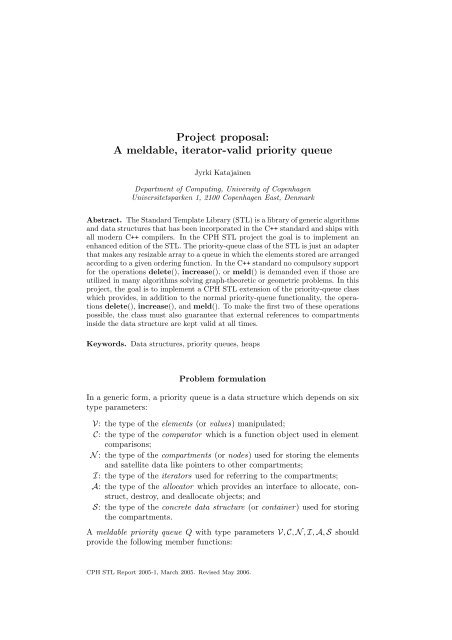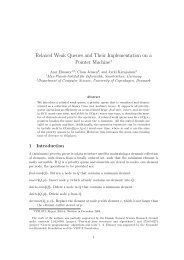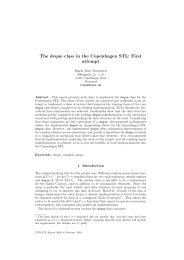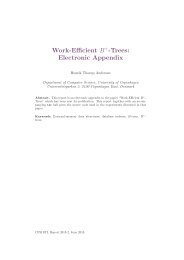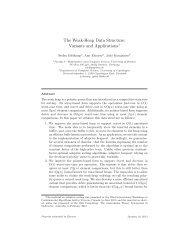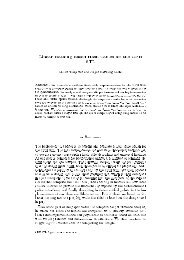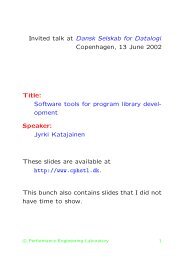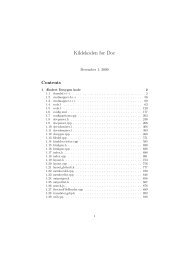Project proposal: A meldable, iterator-valid priority ... - The CPH STL
Project proposal: A meldable, iterator-valid priority ... - The CPH STL
Project proposal: A meldable, iterator-valid priority ... - The CPH STL
Create successful ePaper yourself
Turn your PDF publications into a flip-book with our unique Google optimized e-Paper software.
<strong>Project</strong> <strong>proposal</strong>:<br />
A <strong>meldable</strong>, <strong>iterator</strong>-<strong>valid</strong> <strong>priority</strong> queue<br />
Jyrki Katajainen<br />
Department of Computing, University of Copenhagen<br />
Universitetsparken 1, 2100 Copenhagen East, Denmark<br />
Abstract. <strong>The</strong> Standard Template Library (<strong>STL</strong>) is a library of generic algorithms<br />
and data structures that has been incorporated in the C++ standard and ships with<br />
all modern C++ compilers. In the <strong>CPH</strong> <strong>STL</strong> project the goal is to implement an<br />
enhanced edition of the <strong>STL</strong>. <strong>The</strong> <strong>priority</strong>-queue class of the <strong>STL</strong> is just an adapter<br />
that makes any resizable array to a queue in which the elements stored are arranged<br />
according to a given ordering function. In the C++ standard no compulsory support<br />
for the operations delete(), increase(), or meld() is demanded even if those are<br />
utilized in many algorithms solving graph-theoretic or geometric problems. In this<br />
project, the goal is to implement a <strong>CPH</strong> <strong>STL</strong> extension of the <strong>priority</strong>-queue class<br />
which provides, in addition to the normal <strong>priority</strong>-queue functionality, the operations<br />
delete(), increase(), and meld(). To make the first two of these operations<br />
possible, the class must also guarantee that external references to compartments<br />
inside the data structure are kept <strong>valid</strong> at all times.<br />
Keywords. Data structures, <strong>priority</strong> queues, heaps<br />
Problem formulation<br />
In a generic form, a <strong>priority</strong> queue is a data structure which depends on six<br />
type parameters:<br />
V: the type of the elements (or values) manipulated;<br />
C: the type of the comparator which is a function object used in element<br />
comparisons;<br />
N: the type of the compartments (or nodes) used for storing the elements<br />
and satellite data like pointers to other compartments;<br />
I: the type of the <strong>iterator</strong>s used for referring to the compartments;<br />
A: the type of the allocator which provides an interface to allocate, construct,<br />
destroy, and deallocate objects; and<br />
S: the type of the concrete data structure (or container) used for storing<br />
the compartments.<br />
A <strong>meldable</strong> <strong>priority</strong> queue Q with type parameters V, C, N,I, A, S should<br />
provide the following member functions:<br />
<strong>CPH</strong> <strong>STL</strong> Report 2005-1, March 2005. Revised May 2006.
2 Jyrki Katajainen<br />
I find-max(): Return an <strong>iterator</strong> to the compartment which stores an<br />
element that, of all elements in Q, has the maximum value. <strong>The</strong> ordering<br />
criterion used is C. If Q is empty, an <strong>iterator</strong> referring to the<br />
one-past-the-end element is returned.<br />
I insert(V e): Insert element e into Q and return an <strong>iterator</strong> to the compartment<br />
storing e for later use. If there is not space available to<br />
accomplish this operation, an <strong>iterator</strong> referring to the one-past-the-end<br />
element is returned. Requirement: Element e is passed by reference<br />
and is not modified.<br />
void delete-max(): Remove a maximum element and its compartment from<br />
Q. Requirement: Q is not empty.<br />
I delete(I p): Remove both the element stored at the compartment referred<br />
to by p and the compartment itself from Q. An <strong>iterator</strong> to the<br />
position one past the erased element is returned. Requirement: p<br />
refers to an existing compartment.<br />
void increase(I p, V e): Replace the element stored at the compartment<br />
referred to by p with element e. Requirement: p refers to an existing<br />
compartment. e is no smaller than the old element stored at that<br />
compartment. Element e is passed by reference and is not modified.<br />
void meld(<strong>meldable</strong> <strong>priority</strong> queue R): Move all elements together with<br />
their compartments from R to Q thereby destroying R. Requirement:<br />
R is passed by reference.<br />
Some additional member functions—like a constructor, a destructor, and a<br />
set of functions to be used for examining the number of elements stored in<br />
Q—are necessary to make the data structure useful.<br />
A complete declaration of the <strong>priority</strong>-queue class is given in appendix A.<br />
In this declaration, the standard <strong>STL</strong> concepts are mixed with those often<br />
found in the algorithmic literature. <strong>The</strong> correspondence between the two<br />
sets of concepts is as follows:<br />
Algorithmic concept<br />
find-max()<br />
insert()<br />
delete-max()<br />
delete()<br />
pointer to a compartment<br />
<strong>STL</strong> concept<br />
top()<br />
push()<br />
pop()<br />
erase()<br />
<strong>iterator</strong><br />
<strong>The</strong> meaning of the member types and member functions declared should<br />
be self-explanatory. Further details can be found from the C++ standard [1,<br />
Clause 23], or any other source on the <strong>STL</strong>.<br />
In the <strong>CPH</strong> <strong>STL</strong> [6], the current implementation (see appendix C) of the<br />
<strong>priority</strong>-queue class is based on binary heaps [21]. In this project, the goal<br />
is to develop competitors for binary heaps, and to compare the efficiency of<br />
these new <strong>priority</strong>-queue realizations against the binary-heap implementation.<br />
<strong>The</strong> challenges lie in the realization of the member functions insert()
A <strong>meldable</strong>, <strong>iterator</strong>-<strong>valid</strong> <strong>priority</strong> queue 3<br />
and increase() having logarithmic worst-case cost for binary heaps, and<br />
meld() having polylogarithmic worst-case cost for (pointer-based) binary<br />
heaps [17, 18, 19]. All these three operations can be realized faster using<br />
other <strong>meldable</strong> <strong>priority</strong>-queue structures.<br />
Any of the <strong>priority</strong>-queue structures presented in the algorithmic literature<br />
(see, for example, [5, 8] and the references mentioned therein) can be used<br />
as the basis of the implementation work. Especially noteworthy alternatives<br />
to binary heaps are the following data structures, but other data structures<br />
may be considered as well:<br />
Data structure Reference<br />
Binomial queues [20] (see also [5, Chapter 19])<br />
Brodal’s heaps [2]<br />
Fat heaps [13, 14]<br />
Leftist trees [4] (see also [15, Section 5.2.3])<br />
Maxiphobic heaps [16]<br />
Multiary heaps [12]<br />
Navigation piles [11]<br />
Relaxed weak queues [9]<br />
Run-relaxed heaps [7, 10]<br />
Space-efficient heaps [3]<br />
Be aware that some of these data structures are rather complicated. Now<br />
you have be warned!<br />
Let n denote the number of elements stored or to be stored in the data<br />
structure. <strong>The</strong> resulting implementations should fulfil the following complexity<br />
requirements given in the C++ standard:<br />
find-max(): constant time<br />
insert(): at most lg n element comparisons<br />
delete(): at most 2lg n element comparisons<br />
general constructor: at most 3n element comparisons<br />
<strong>iterator</strong> functions: constant time (amortized).<br />
Naturally, the resulting implementations should guarantee <strong>iterator</strong> <strong>valid</strong>ity.<br />
That is, when an element is inserted, an <strong>iterator</strong> referring to the compartment,<br />
where it is stored, should remain the same so that possible later<br />
references made by delete() and increase() are <strong>valid</strong>. <strong>The</strong> strength of the<br />
<strong>iterator</strong>s supported should be bidirectional.<br />
Appendix: Source code<br />
<strong>The</strong> source code given in this appendix can be used as an inspiration for the<br />
project. This appedix describes the bridge class <strong>meldable</strong> <strong>priority</strong> queue<br />
and gives a single realization of that class based on binary heaps. All the<br />
files described, including the associated scripts, are available for download<br />
on the <strong>CPH</strong> <strong>STL</strong> website [6] (see menu item Downloads).
4 Jyrki Katajainen<br />
A. Meldable <strong>priority</strong> queues ....................................... 4<br />
A.1 Program/<strong>meldable</strong> <strong>priority</strong> queue.h++ ..................... 4<br />
A.2 Program/<strong>meldable</strong> <strong>priority</strong> queue.c++ ..................... 6<br />
B. Example .......................................................... 9<br />
B.1 A pointer-based binary heap storing 10 integers ................ 9<br />
C. Binary heaps ................................................... 10<br />
C.1 Program/binary heap.h++ .................................. 10<br />
C.2 Program/binary heap.c++ .................................. 13<br />
D. Heap nodes ..................................................... 20<br />
D.1 Program/heap node.h++ .................................... 20<br />
E. Property maps ................................................. 22<br />
E.1 Program/property maps.h++ ................................ 22<br />
F. Bidirectional <strong>iterator</strong>s ......................................... 26<br />
F.1 Program/bidirectional <strong>iterator</strong>.h++ ..................... 26<br />
G. Skew binary numbers ......................................... 30<br />
G.1 Program/skew binary number.h++ .......................... 30<br />
H. Benz forms ..................................................... 33<br />
H.1 Benchmark/sort int pentium.py ........................... 33<br />
H.2 Benchmark/experiment.c++ ................................. 34<br />
H.3 Benchmark/drive.c++ ....................................... 34<br />
I. UNIX makefiles ................................................. 35<br />
I.1 Program/makefile .......................................... 35<br />
I.2 Benchmark/makefile ........................................ 35<br />
A. Meldable <strong>priority</strong> queues<br />
A.1 Program/<strong>meldable</strong> <strong>priority</strong> queue.h++<br />
/*<br />
Author: Jyrki Katajainen, March 2005; Revised May 2006<br />
A <strong>meldable</strong> <strong>priority</strong> queue is a reversible container (as a set and<br />
multiset) which provides constant bidirectional <strong>iterator</strong>s to the<br />
elements stored.<br />
<strong>CPH</strong> <strong>STL</strong> guarantees:<br />
- Member function push() returns an <strong>iterator</strong> (or a handle) to the<br />
given element and this <strong>iterator</strong> remains <strong>valid</strong> the whole life time of<br />
the element.<br />
- Iterator operations take constant time in the worst case.<br />
- Member function top() is a constant-time operation.<br />
- Member functions push(), pop(), erase(), and increase() have the<br />
logarithmic worst-case cost.<br />
- Member function meld() is relatively fast having a polylogarithmic<br />
worst-case cost.
A <strong>meldable</strong>, <strong>iterator</strong>-<strong>valid</strong> <strong>priority</strong> queue 5<br />
- <strong>The</strong> data structure uses a linear number of words in addition to the<br />
elements stored.<br />
Container requirements not fulfilled [C++ standard §23]:<br />
- For two <strong>meldable</strong> <strong>priority</strong> queues a and b, the following expressions<br />
are not supported: a ≡ b, a ≢ b, a < b, a > b, a ≤ b, and a ≥ b.<br />
*/<br />
#ifndef __<strong>CPH</strong><strong>STL</strong>_MELDABLE_PRIORITY_QUEUE__<br />
#define __<strong>CPH</strong><strong>STL</strong>_MELDABLE_PRIORITY_QUEUE__<br />
#include // defines std::less<br />
#include // defines std::reverse_<strong>iterator</strong><br />
#include // defines std::allocator<br />
#include "binary_heap.h++" // defines cphstl::binary_heap<br />
namespace cphstl {<br />
template <<br />
typename V,<br />
typename C = std::less,<br />
typename A = std::allocator,<br />
typename S = cphstl::binary_heap <br />
><br />
class <strong>meldable</strong>_<strong>priority</strong>_queue {<br />
public:<br />
// types<br />
typedef typename S::size_type size_type;<br />
typedef typename S::difference_type difference_type;<br />
typedef typename S::pointer pointer;<br />
typedef typename S::const_pointer const_pointer;<br />
typedef typename S::reference reference;<br />
typedef typename S::const_reference const_reference;<br />
typedef typename S::value_type value_type;<br />
typedef typename S::<strong>iterator</strong> <strong>iterator</strong>;<br />
typedef typename S::const_<strong>iterator</strong> const_<strong>iterator</strong>;<br />
typedef std::reverse_<strong>iterator</strong> reverse_<strong>iterator</strong>;<br />
typedef std::reverse_<strong>iterator</strong> const_reverse_<strong>iterator</strong>;<br />
typedef C comparator_type;<br />
typedef typename S::allocator_type allocator_type<br />
typedef S container_type;<br />
protected:<br />
container_type container_;<br />
public:<br />
// structors<br />
explicit <strong>meldable</strong>_<strong>priority</strong>_queue(const C& = C(), const A& = A());<br />
<strong>meldable</strong>_<strong>priority</strong>_queue(const <strong>meldable</strong>_<strong>priority</strong>_queue&);<br />
<strong>meldable</strong>_<strong>priority</strong>_queue& operator=(const <strong>meldable</strong>_<strong>priority</strong>_queue&);<br />
~<strong>meldable</strong>_<strong>priority</strong>_queue();<br />
// observers<br />
allocator_type get_allocator() const;<br />
comparator_type get_comparator() const;<br />
// <strong>iterator</strong>s<br />
<strong>iterator</strong> begin();<br />
const_<strong>iterator</strong> begin() const;
6 Jyrki Katajainen<br />
<strong>iterator</strong> end();<br />
const_<strong>iterator</strong> end() const;<br />
reverse_<strong>iterator</strong> rbegin();<br />
const_reverse_<strong>iterator</strong> rbegin() const;<br />
reverse_<strong>iterator</strong> rend();<br />
const_reverse_<strong>iterator</strong> rend() const;<br />
// capacity<br />
bool empty() const;<br />
size_type size() const;<br />
size_type max_size() const;<br />
// access<br />
<strong>iterator</strong> top() const;<br />
// modifiers<br />
<strong>iterator</strong> push(const value_type &);<br />
void pop();<br />
<strong>iterator</strong> erase(<strong>iterator</strong>);<br />
void increase(<strong>iterator</strong>, const value_type &);<br />
void clear();<br />
void meld(<strong>meldable</strong>_<strong>priority</strong>_queue&);<br />
void swap(<strong>meldable</strong>_<strong>priority</strong>_queue&);<br />
};<br />
// algorithms<br />
template <br />
<strong>meldable</strong>_<strong>priority</strong>_queue &<br />
meld(<strong>meldable</strong>_<strong>priority</strong>_queue &,<br />
<strong>meldable</strong>_<strong>priority</strong>_queue &);<br />
template <br />
void swap(<strong>meldable</strong>_<strong>priority</strong>_queue &,<br />
<strong>meldable</strong>_<strong>priority</strong>_queue &);<br />
} // namespace cphstl<br />
#include "<strong>meldable</strong>_<strong>priority</strong>_queue.c++" // defines cphstl::<strong>meldable</strong>_<strong>priority</strong>_queue<br />
#endif // __<strong>CPH</strong><strong>STL</strong>_MELDABLE_PRIORITY_QUEUE__<br />
A.2 Program/<strong>meldable</strong> <strong>priority</strong> queue.c++<br />
/*<br />
Author: Jyrki Katajainen, May 2006<br />
A <strong>meldable</strong> <strong>priority</strong> queue is a bridge class that just calls the<br />
functions available in the implementation class.<br />
*/<br />
namespace cphstl {<br />
template <br />
<strong>meldable</strong>_<strong>priority</strong>_queue ::<strong>meldable</strong>_<strong>priority</strong>_queue (<br />
const C& comparator, const A& allocator) : container_(comparator , allocator) {<br />
}<br />
template <br />
<strong>meldable</strong>_<strong>priority</strong>_queue ::<strong>meldable</strong>_<strong>priority</strong>_queue(<br />
const <strong>meldable</strong>_<strong>priority</strong>_queue& other) : container_(other.container_) {<br />
};
A <strong>meldable</strong>, <strong>iterator</strong>-<strong>valid</strong> <strong>priority</strong> queue 7<br />
template <br />
<strong>meldable</strong>_<strong>priority</strong>_queue ::<strong>meldable</strong>_<strong>priority</strong>_queue&<br />
<strong>meldable</strong>_<strong>priority</strong>_queue ::operator=(<br />
const <strong>meldable</strong>_<strong>priority</strong>_queue& other) {<br />
container_.operator=(other.container_ );<br />
};<br />
template <br />
<strong>meldable</strong>_<strong>priority</strong>_queue ::~<strong>meldable</strong>_<strong>priority</strong>_queue() {<br />
};<br />
template <br />
typename <strong>meldable</strong>_<strong>priority</strong>_queue ::allocator_type<br />
<strong>meldable</strong>_<strong>priority</strong>_queue ::get_allocator() const {<br />
return container_.get_allocator();<br />
}<br />
template <br />
typename <strong>meldable</strong>_<strong>priority</strong>_queue ::comparator_type<br />
<strong>meldable</strong>_<strong>priority</strong>_queue ::get_comparator() const {<br />
return container_.get_comparator();<br />
};<br />
template <br />
typename <strong>meldable</strong>_<strong>priority</strong>_queue ::<strong>iterator</strong><br />
<strong>meldable</strong>_<strong>priority</strong>_queue ::begin() {<br />
return container_.begin();<br />
};<br />
template <br />
typename <strong>meldable</strong>_<strong>priority</strong>_queue ::const_<strong>iterator</strong><br />
<strong>meldable</strong>_<strong>priority</strong>_queue ::begin() const {<br />
return const_<strong>iterator</strong>(container_.begin());<br />
};<br />
template <br />
typename <strong>meldable</strong>_<strong>priority</strong>_queue ::<strong>iterator</strong><br />
<strong>meldable</strong>_<strong>priority</strong>_queue ::end() {<br />
return container_.end();<br />
};<br />
template <br />
typename <strong>meldable</strong>_<strong>priority</strong>_queue ::const_<strong>iterator</strong><br />
<strong>meldable</strong>_<strong>priority</strong>_queue ::end() const {<br />
return const_<strong>iterator</strong>(container_.end());<br />
};<br />
template <br />
typename <strong>meldable</strong>_<strong>priority</strong>_queue ::reverse_<strong>iterator</strong><br />
<strong>meldable</strong>_<strong>priority</strong>_queue ::rbegin() {<br />
return reverse_<strong>iterator</strong>(end());<br />
};<br />
template <br />
typename <strong>meldable</strong>_<strong>priority</strong>_queue ::const_reverse_<strong>iterator</strong><br />
<strong>meldable</strong>_<strong>priority</strong>_queue ::rbegin() const {<br />
return const_reverse_<strong>iterator</strong>(end());<br />
};<br />
template <br />
typename <strong>meldable</strong>_<strong>priority</strong>_queue ::reverse_<strong>iterator</strong><br />
<strong>meldable</strong>_<strong>priority</strong>_queue ::rend() {<br />
return reverse_<strong>iterator</strong>(begin());<br />
};
8 Jyrki Katajainen<br />
template <br />
typename <strong>meldable</strong>_<strong>priority</strong>_queue ::const_reverse_<strong>iterator</strong><br />
<strong>meldable</strong>_<strong>priority</strong>_queue ::rend() const {<br />
return const_reverse_<strong>iterator</strong>(begin());<br />
};<br />
template <br />
bool<br />
<strong>meldable</strong>_<strong>priority</strong>_queue ::empty() const {<br />
return (*this).size() ≡ size_type(0);<br />
};<br />
template <br />
typename <strong>meldable</strong>_<strong>priority</strong>_queue ::size_type<br />
<strong>meldable</strong>_<strong>priority</strong>_queue ::size() const {<br />
return container_.size();<br />
};<br />
template <br />
typename <strong>meldable</strong>_<strong>priority</strong>_queue ::size_type<br />
<strong>meldable</strong>_<strong>priority</strong>_queue ::max_size() const {<br />
return container_.max_size();<br />
};<br />
template <br />
typename <strong>meldable</strong>_<strong>priority</strong>_queue ::<strong>iterator</strong><br />
<strong>meldable</strong>_<strong>priority</strong>_queue ::top() const {<br />
return container_.top();<br />
};<br />
template <br />
typename <strong>meldable</strong>_<strong>priority</strong>_queue ::<strong>iterator</strong><br />
<strong>meldable</strong>_<strong>priority</strong>_queue ::push(const value_type& e) {<br />
return container_.push(e);<br />
};<br />
template <br />
void<br />
<strong>meldable</strong>_<strong>priority</strong>_queue ::pop() {<br />
(void)(*this).erase((*this).top());<br />
};<br />
template <br />
typename <strong>meldable</strong>_<strong>priority</strong>_queue ::<strong>iterator</strong><br />
<strong>meldable</strong>_<strong>priority</strong>_queue ::erase(<strong>iterator</strong> p) {<br />
return container_.erase(p);<br />
};<br />
template <br />
void<br />
<strong>meldable</strong>_<strong>priority</strong>_queue ::increase(<br />
<strong>iterator</strong> p, const value_type& e) {<br />
container_.increase(p, e);<br />
};<br />
template <br />
void<br />
<strong>meldable</strong>_<strong>priority</strong>_queue ::clear() {<br />
container_.clear();<br />
};<br />
template <br />
void<br />
<strong>meldable</strong>_<strong>priority</strong>_queue ::meld(<strong>meldable</strong>_<strong>priority</strong>_queue& r) {<br />
container_.meld(r);
A <strong>meldable</strong>, <strong>iterator</strong>-<strong>valid</strong> <strong>priority</strong> queue 9<br />
};<br />
template <br />
void<br />
<strong>meldable</strong>_<strong>priority</strong>_queue ::swap(<strong>meldable</strong>_<strong>priority</strong>_queue& r) {<br />
container_.swap(r);<br />
};<br />
template <br />
<strong>meldable</strong>_<strong>priority</strong>_queue &<br />
meld(<strong>meldable</strong>_<strong>priority</strong>_queue & r,<br />
<strong>meldable</strong>_<strong>priority</strong>_queue & s) {<br />
r.meld(s);<br />
return r;<br />
};<br />
template <br />
void swap(<strong>meldable</strong>_<strong>priority</strong>_queue & r,<br />
<strong>meldable</strong>_<strong>priority</strong>_queue & s) {<br />
r.swap(s);<br />
};<br />
} // namespace cphstl<br />
B. Example<br />
B.1 A pointer-based binary heap storing 10 integers<br />
In addition to normal nodes, there are four different kinds of dummies:<br />
1. a unique sentinel to which other nodes point if some of their neighbouring<br />
nodes are missing;<br />
2. heads that keep track of the roots of the perfect binary heaps;<br />
3. tails that are the last nodes in the lists tying the nodes of a perfect<br />
binary heap together; and
10 Jyrki Katajainen<br />
4. the past-the-end head that is the last node in the list tying the heads<br />
together.<br />
C.1 Program/binary heap.h++<br />
C. Binary heaps<br />
/*<br />
Author: Jyrki Katajainen, May 2006<br />
A <strong>priority</strong> queue implemented as a collection of pointer-based perfect<br />
binary heaps (in the same way as a binomial queue is implemented a<br />
collection of binomial trees). <strong>The</strong> idea of using the canonical<br />
representation of skew-binary numbers is borrowed from [Eugene<br />
W. Myers. An applicative random-access stack. Information Processing<br />
Letters 17 (1983), 241-248]. <strong>The</strong> idea of using a hierarchy of<br />
management classes is taken from the book [P.J. Plauger, Alexander<br />
A. Stepanov, Meng Lee, and David R. Musser. <strong>The</strong> C++ Standard Template<br />
Library. Prentice Hall PTR (2001)].<br />
<strong>CPH</strong> <strong>STL</strong> guarantees:<br />
- Let n be the number of elements stored prior to each operation.<br />
Member functions guarantee the following worst-case complexity<br />
bounds:<br />
push(): O(lg n) [O(1) amortized]<br />
erase(), increase(): O(lg n)<br />
meld(): O(max{lg m, lg n} 2 ) [m and n are the sizes of the queues melded]<br />
clear(): O(n)<br />
others: O(1)<br />
- <strong>The</strong> amount of extra space used is 4n + O(lg n) words.<br />
*/<br />
#ifndef __<strong>CPH</strong><strong>STL</strong>_BINARY_HEAP__<br />
#define __<strong>CPH</strong><strong>STL</strong>_BINARY_HEAP__<br />
#include // defines std::less<br />
#include // defines std::allocator<br />
#include "heap_node.h++" // defines the nodes used<br />
#include "property_maps.h++" // defines the property maps used<br />
#include "bidirectional_<strong>iterator</strong>.h++" // defines cphstl:bidirectional_<strong>iterator</strong><br />
#include "skew_binary_number.h++" // defines cphstl::skew_binary_number<br />
namespace cphstl {<br />
namespace heap {<br />
template <br />
class comparator_management {<br />
protected:<br />
typedef C comparator_type;<br />
comparator_management(const comparator_type& c) : comparator_(c) {<br />
}<br />
comparator_type comparator_;<br />
};<br />
template <br />
class node_management : public cphstl::heap::comparator_management {<br />
protected:
A <strong>meldable</strong>, <strong>iterator</strong>-<strong>valid</strong> <strong>priority</strong> queue 11<br />
typedef V value_type;<br />
typedef C comparator_type;<br />
typedef typename A::template rebind::other allocator_type;<br />
typedef N node_type;<br />
typedef typename A::template rebind::other::pointer link_type;<br />
node_management(const comparator_type& c, const allocator_type& a)<br />
: comparator_management (c), node_allocator_(a) {<br />
}<br />
typename allocator_type::template rebind::other node_allocator_;<br />
};<br />
{<br />
template <br />
class link_management : public cphstl::heap::node_management <br />
protected:<br />
typedef V value_type;<br />
typedef C comparator_type;<br />
typedef typename A::template rebind::other allocator_type;<br />
typedef N node_type;<br />
typedef typename A::template rebind::other::pointer link_type;<br />
link_management(const comparator_type& c, const allocator_type& a)<br />
: node_management (c, a), link_allocator_(a) {<br />
}<br />
typename allocator_type::template rebind::other link_allocator_;<br />
};<br />
template <br />
class value_management : public cphstl::heap::link_management {<br />
protected:<br />
typedef V value_type;<br />
typedef C comparator_type;<br />
typedef typename A::template rebind::other allocator_type;<br />
typedef N node_type;<br />
value_management(const comparator_type& c, const allocator_type& a)<br />
: link_management (c, a), value_allocator_(a) {<br />
}<br />
allocator_type value_allocator_;<br />
};<br />
} // namespace heap<br />
template <<br />
typename V,<br />
typename C = std::less,<br />
typename A = std::allocator,<br />
typename N = cphstl::heap::node<br />
><br />
class binary_heap : public cphstl::heap::value_management {<br />
public:<br />
// types<br />
typedef V value_type;<br />
typedef C comparator_type;<br />
typedef typename A::template rebind ::other allocator_type;<br />
typedef N node_type;<br />
typedef binary_heap container_type;<br />
typedef typename allocator_type::size_type size_type;<br />
typedef typename allocator_type::difference_type difference_type;<br />
typedef typename allocator_type::pointer pointer;<br />
typedef typename allocator_type::const_pointer const_pointer;
12 Jyrki Katajainen<br />
typedef typename allocator_type::reference reference;<br />
typedef typename allocator_type::const_reference const_reference;<br />
typedef cphstl::bidirectional_<strong>iterator</strong> <<br />
cphstl::heap::value_map,<br />
cphstl::heap::successor_map ,<br />
cphstl::heap::predecessor_map , true > const_<strong>iterator</strong>;<br />
typedef const_<strong>iterator</strong> <strong>iterator</strong>;<br />
protected:<br />
typedef cphstl::heap::comparator_management comparator_management;<br />
typedef cphstl::heap::node_management node_management;<br />
typedef cphstl::heap::link_management link_management;<br />
typedef cphstl::heap::value_management value_management;<br />
cphstl::skew_binary_number n_;<br />
node_type* past_the_end_;<br />
node_type* top_;<br />
public:<br />
// structors<br />
explicit binary_heap(const comparator_type& c = comparator_type(),<br />
const allocator_type& a = allocator_type())<br />
: value_management(c, a), n_() {<br />
(*this).init();<br />
};<br />
binary_heap(const binary_heap &);<br />
binary_heap& operator=(const binary_heap &);<br />
~binary_heap ();<br />
// observers<br />
allocator_type get_allocator() const;<br />
comparator_type get_comparator() const;<br />
// <strong>iterator</strong>s<br />
const_<strong>iterator</strong> begin() const;<br />
const_<strong>iterator</strong> end() const;<br />
// capacity<br />
size_type size() const;<br />
size_type max_size() const;<br />
// access<br />
<strong>iterator</strong> top() const;<br />
// modifiers<br />
<strong>iterator</strong> push(const value_type &);<br />
<strong>iterator</strong> erase(<strong>iterator</strong>);<br />
void increase(<strong>iterator</strong>, const value_type &);<br />
void clear();<br />
void meld(binary_heap &);<br />
void swap(binary_heap &);<br />
protected:<br />
// helpers<br />
void init();<br />
node_type* create_dummy();<br />
void construct_value(node_type*, const value_type &);<br />
void destruct_value(node_type*);
A <strong>meldable</strong>, <strong>iterator</strong>-<strong>valid</strong> <strong>priority</strong> queue 13<br />
void discard_dummy(node_type*);<br />
void swap_parent_left(node_type*, node_type*);<br />
void swap_parent_right(node_type*, node_type*);<br />
void head_list_erase(node_type*);<br />
void head_list_insert(node_type*, node_type*);<br />
node_type* borrow();<br />
void join(node_type*, node_type*, node_type*);<br />
void sew_up_inner_edges(node_type*, node_type*);<br />
node_type* sew_up_outer_edges(node_type*, node_type*);<br />
void siftdown(node_type*);<br />
void siftup(node_type*);<br />
template <br />
void bulk_insert(I, I);<br />
};<br />
} // namespace cphstl<br />
#include "binary_heap.c++" // defines cphstl::binary_heap<br />
#endif // __<strong>CPH</strong><strong>STL</strong>_BINARY_HEAP__<br />
C.2 Program/binary heap.c++<br />
/*<br />
Author: Jyrki Katajainen, May 2006<br />
In each perfect binary heap the nodes are maintained in a<br />
doubly-linked list. <strong>The</strong> list ends with a dummy node called a<br />
tail. Each node of a heap has a pointer to its left child and its<br />
parent. <strong>The</strong> right child is accessed via the left child. <strong>The</strong> root of<br />
each heap is connected with a dummy called a head. <strong>The</strong> heads are again<br />
maintained in a doubly-linked list, and the heap is accessed via the<br />
first head which is also used as the past-the-end node.<br />
*/<br />
#include // defines ilogb<br />
#include <br />
#include <br />
extern int ilogb(double) throw();<br />
namespace cphstl {<br />
//template <br />
//binary_heap ::binary_heap (const C& c, const A& a) {<br />
// Moved to the declaration because of an error in gcc version 3.3.4<br />
//}<br />
template <br />
binary_heap ::binary_heap(const binary_heap& other)<br />
: value_management(other.comparator_ , other.value_allocator_), n_() {<br />
(*this).init();<br />
(*this).bulk_insert(other.begin(), other.end());<br />
}<br />
template <br />
binary_heap &<br />
binary_heap ::operator=(const binary_heap& other) {<br />
if (this ≢ &other) {<br />
(*this).clear();<br />
(*this).init();<br />
(*this).bulk_insert(other.begin(), other.end());<br />
}<br />
return *this;<br />
}
14 Jyrki Katajainen<br />
template <br />
binary_heap ::~binary_heap () {<br />
(*this).clear();<br />
(*this).discard_dummy(past_the_end_);<br />
n_ = cphstl::skew_binary_number ();<br />
past_the_end_ = 0;<br />
top_ = 0;<br />
}<br />
template <br />
typename binary_heap ::allocator_type<br />
binary_heap ::get_allocator() const {<br />
return (*this).value_allocator_;<br />
}<br />
template <br />
typename binary_heap ::comparator_type<br />
binary_heap ::get_comparator() const {<br />
return (*this).comparator_;<br />
}<br />
template <br />
typename binary_heap ::const_<strong>iterator</strong><br />
binary_heap ::begin() const {<br />
USE_HEAP_PROPERTY_MAPS(V, N)<br />
return const_<strong>iterator</strong>(south[east[past_the_end_]]);<br />
}<br />
template <br />
typename binary_heap ::const_<strong>iterator</strong><br />
binary_heap ::end() const {<br />
return const_<strong>iterator</strong>(past_the_end_);<br />
}<br />
template <br />
typename binary_heap ::size_type<br />
binary_heap ::size() const {<br />
return size_type(n_);<br />
}<br />
template <br />
typename binary_heap ::size_type<br />
binary_heap ::max_size() const {<br />
typename allocator_type::template rebind::other char_allocator;<br />
size_type a = char_allocator.max_size(); // available memory in bytes<br />
size_type b = sizeof(node_type); // size of nodes<br />
size_type c = sizeof(container_type); // size of heap<br />
size_type m = (*this).value_allocator_.max_size(); // max number of elements<br />
// solve n from (4n + 2lg n + 1)b + c = a<br />
return (((a - c)/b - 1)/2 - ilogb(m))/2;<br />
}<br />
template <br />
typename binary_heap ::<strong>iterator</strong><br />
binary_heap ::top() const {<br />
return <strong>iterator</strong>(top_);<br />
}<br />
template <br />
typename binary_heap ::<strong>iterator</strong><br />
binary_heap ::push(const value_type& v) {<br />
USE_HEAP_PROPERTY_MAPS(V, N)<br />
node_type* r = 0;<br />
if (n_.has_a_two()) {<br />
try {
A <strong>meldable</strong>, <strong>iterator</strong>-<strong>valid</strong> <strong>priority</strong> queue 15<br />
}<br />
r = create_dummy();<br />
construct_value(r, v);<br />
}<br />
catch (...) {<br />
discard_dummy(r);<br />
throw;<br />
}<br />
node_type* a = east[past_the_end_];<br />
node_type* b = east[a];<br />
node_type* p = south[a];<br />
node_type* q = south[b];<br />
head_list_erase(b);<br />
north[r] = a;<br />
south[a] = r;<br />
join(p, q, r);<br />
}<br />
else {<br />
node_type* h = 0;<br />
node_type* t = 0;<br />
try {<br />
r = create_dummy();<br />
construct_value(r, v);<br />
h = create_dummy();<br />
t = create_dummy();<br />
}<br />
catch (...) {<br />
discard_dummy(t);<br />
discard_dummy(h);<br />
destruct_value(r);<br />
discard_dummy(r);<br />
throw;<br />
}<br />
north[h] = h;<br />
head_list_insert(h, past_the_end_);<br />
south[h] = r;<br />
north[r] = h; east[r] = t; west[r] = t;<br />
east[t] = r; west[t] = r;<br />
assert(south[r] ≡ (*r).nil);<br />
}<br />
++n_;<br />
if (top_ ≡ past_the_end_ || (*this).comparator_(value[top_], value[r])) {<br />
top_ = r;<br />
}<br />
return <strong>iterator</strong>(r);<br />
template <br />
typename binary_heap ::<strong>iterator</strong><br />
binary_heap ::erase(<strong>iterator</strong> p) {<br />
// not implemented<br />
--n_;<br />
return past_the_end_;<br />
}<br />
template <br />
void<br />
binary_heap ::increase(<strong>iterator</strong> p, const value_type& v) {<br />
// not implemented<br />
}<br />
template <br />
void<br />
binary_heap ::clear() {<br />
// not implemented<br />
}
16 Jyrki Katajainen<br />
template <br />
void<br />
binary_heap ::meld(binary_heap& other) {<br />
// not implemented<br />
}<br />
template <br />
void<br />
binary_heap ::swap(binary_heap& other) {<br />
// not implemented<br />
}<br />
// helpers<br />
template <br />
void<br />
binary_heap ::init() {<br />
USE_HEAP_PROPERTY_MAPS(V, N)<br />
past_the_end_ = create_dummy();<br />
north[past_the_end_] = past_the_end_;<br />
east[past_the_end_] = past_the_end_;<br />
south[past_the_end_] = past_the_end_;<br />
west[past_the_end_] = past_the_end_;<br />
top_ = past_the_end_;<br />
}<br />
template <br />
typename binary_heap ::node_type*<br />
binary_heap ::create_dummy() {<br />
node_type* p = (*this).node_allocator_.allocate(1);<br />
(*this).link_allocator_.construct(&(*p).north, &(*p).sentinel);<br />
(*this).link_allocator_.construct(&(*p).east, &(*p).sentinel);<br />
(*this).link_allocator_.construct(&(*p).south, &(*p).sentinel);<br />
(*this).link_allocator_.construct(&(*p).west, &(*p).sentinel);<br />
return p;<br />
}<br />
template <br />
void<br />
binary_heap ::construct_value(node_type* p, const value_type& v) {<br />
(*this).value_allocator_.construct(&(*p).value, v);<br />
}<br />
template <br />
void<br />
binary_heap ::destruct_value(node_type* p) {<br />
if (p ≢ 0) {<br />
(*this).value_allocator_.destroy(&(*p).value);<br />
}<br />
}<br />
template <br />
void<br />
binary_heap ::discard_dummy(node_type* p) {<br />
if (p ≢ 0) {<br />
(*this).link_allocator_.destroy(&(*p).west);<br />
(*this).link_allocator_.destroy(&(*p).south);<br />
(*this).link_allocator_.destroy(&(*p).east);<br />
(*this).link_allocator_.destroy(&(*p).north);<br />
(*this).node_allocator_.deallocate(p, 1);<br />
}<br />
}<br />
template
A <strong>meldable</strong>, <strong>iterator</strong>-<strong>valid</strong> <strong>priority</strong> queue 17<br />
void<br />
binary_heap ::swap_parent_left(node_type* x, node_type* y) {<br />
USE_HEAP_PROPERTY_MAPS(V, N)<br />
node_type* x_n = north[x]; node_type* x_e = east[x];<br />
node_type* x_w = west[x];<br />
node_type* y_e = east[y]; node_type* y_s = south[y];<br />
node_type* y_w = west[y];<br />
if (x_e ≡ y) {<br />
south[x_n] = y; east[x_w] = y;<br />
west[y_e] = x;<br />
if (!is_nil[y_s]) {<br />
north[y_s] = x;<br />
}<br />
north[y] = x_n; east[y] = x; south[y] = x; west[y] = x_w;<br />
north[x] = y; east[x] = y_e; south[x] = y_s; west[x] = y;<br />
}<br />
else {<br />
south[x_n] = y; east[x_w] = y; west[x_e] = y;<br />
east[y_w] = x; west[y_e] = x;<br />
if (!is_nil[y_s]) {<br />
north[y_s] = x;<br />
}<br />
north[y] = x_n; east[y] = x_e; south[y] = x; west[y] = x_w;<br />
north[x] = y; east[x] = y_e; south[x] = y_s; west[x] = y_w;<br />
}<br />
}<br />
template <br />
void<br />
binary_heap ::swap_parent_right(node_type* x, node_type* y) {<br />
USE_HEAP_PROPERTY_MAPS(V, N)<br />
node_type* x_n = north[x]; node_type* x_e = east[x];<br />
node_type* x_w = west[x]; node_type* x_s = south[x];<br />
node_type* y_e = east[y]; node_type* y_s = south[y];<br />
node_type* y_w = west[y];<br />
south[x_n] = y; east[x_w] = y; north[x_s] = y; west[x_e] = y;<br />
east[y_w] = x; west[y_e] = x;<br />
if (!is_nil[y_s]) {<br />
north[y_s] = x;<br />
}<br />
north[y] = x_n; east[y] = x_e; south[y] = x_s; west[y] = x_w;<br />
north[x] = x; east[x] = y_e; south[x] = y_s; west[x] = y_w;<br />
}<br />
template <br />
void<br />
binary_heap ::head_list_insert(node_type* b, node_type* a) {<br />
// Insert b after a<br />
USE_HEAP_PROPERTY_MAPS(V, N)<br />
node_type* c = east[a];<br />
east[a] = b;<br />
west[b] = a;<br />
east[b] = c;<br />
west[c] = b;<br />
}<br />
template <br />
void<br />
binary_heap ::head_list_erase(node_type* b) {<br />
USE_HEAP_PROPERTY_MAPS(V, N)<br />
node_type* pred = west[b];<br />
node_type* succ = east[b];<br />
east[pred] = succ;<br />
west[succ] = pred;<br />
discard_dummy(b);
18 Jyrki Katajainen<br />
}<br />
template <br />
typename binary_heap ::node_type*<br />
binary_heap ::borrow() {<br />
// not implemented<br />
}<br />
template <br />
void<br />
binary_heap ::join(node_type* p, node_type* q, node_type* r) {<br />
USE_HEAP_PROPERTY_MAPS(V, N)<br />
discard_dummy(west[p]);<br />
south[r] = p;<br />
north[p] = r;<br />
north[q] = q;<br />
sew_up_inner_edges(p, q);<br />
node_type* last = sew_up_outer_edges(p, r);<br />
last = east[last];<br />
west[r] = last;<br />
east[last] = r;<br />
siftdown(r);<br />
}<br />
template <br />
void<br />
binary_heap ::sew_up_inner_edges(node_type* p, node_type* q) {<br />
USE_HEAP_PROPERTY_MAPS(V, N)<br />
while (!is_nil[p]) {<br />
east[p] = q;<br />
west[q] = p;<br />
p = right[p];<br />
q = left[q];<br />
}<br />
}<br />
template <br />
typename binary_heap ::node_type*<br />
binary_heap ::sew_up_outer_edges(node_type* p, node_type* r) {<br />
USE_HEAP_PROPERTY_MAPS(V, N)<br />
while (!is_nil[p]) {<br />
west[p] = r;<br />
east[r] = p;<br />
p = left[p];<br />
r = right[r];<br />
}<br />
return r;<br />
}<br />
template <br />
void<br />
binary_heap ::siftdown(node_type* r) {<br />
USE_HEAP_PROPERTY_MAPS(V, N)<br />
node_type* p = left[r];<br />
while (!is_nil[p]) {<br />
node_type* q = right[r];<br />
if ((*this).comparator_(value[p], value[q])) {<br />
if ((*this).comparator_(value[r], value[q])) {<br />
(*this).swap_parent_right(r, q);<br />
p = left[r];<br />
}<br />
else break;<br />
}<br />
else {<br />
if ((*this).comparator_(value[r], value[p])) {
A <strong>meldable</strong>, <strong>iterator</strong>-<strong>valid</strong> <strong>priority</strong> queue 19<br />
}<br />
}<br />
}<br />
(*this).swap_parent_left(r, p);<br />
p = left[r];<br />
}<br />
else break;<br />
template <br />
void<br />
binary_heap ::siftup(node_type* p) {<br />
return p;<br />
// not implemented<br />
}<br />
template <br />
template <br />
void<br />
binary_heap ::bulk_insert(I first, I last) {<br />
// not implemented<br />
}<br />
} // namespace cphstl<br />
#undef USE_HEAP_PROPERTY_MAPS<br />
#if defined(UNITTEST_BINARY_HEAP)<br />
#define __main__ main<br />
#include <br />
#include <br />
#include <br />
#include <br />
template <br />
class unittest_binary_heap {<br />
public:<br />
void operator()() {<br />
typedef cphstl::binary_heap heap;<br />
heap h;<br />
assert(h.size() ≡ 0);<br />
assert(h.begin() ≡ h.end());<br />
typename heap::allocator_type heap_a = h.get_allocator();<br />
std::allocator std_a;<br />
assert(heap_a ≡ std_a);<br />
typename heap::comparator_type heap_c = h.get_comparator();<br />
assert(h.size() ≤ h.max_size());<br />
assert(h.top() ≡ h.end());<br />
V a[] = {8, 10, 13, 1, 6, 5, 3, 7, 11, 9};<br />
unsigned int n = sizeof(a)/sizeof(V);<br />
h.push(a[0]);<br />
assert(h.top() ≡ h.begin());<br />
typename heap::<strong>iterator</strong> t = h.top();<br />
assert(*t ≡ V(8));<br />
//*t = 12; /* Compilation should fail */<br />
for (typename heap::<strong>iterator</strong> p = h.begin(); p ≢ h.end();) {<br />
++p;<br />
}<br />
for (typename heap::<strong>iterator</strong> p = h.end(); p ≢ h.begin(); ) {<br />
--p;<br />
}<br />
for (unsigned int j = 1; j < n; ++j) {<br />
h.push(a[j]);<br />
assert(*(h.top()) ≡ *(std::max_element (&a[0], &a[j + 1])));
20 Jyrki Katajainen<br />
}<br />
};<br />
for (typename heap::<strong>iterator</strong> p = h.begin(); p ≢ h.end(); ) {<br />
++p;<br />
}<br />
for (typename heap::<strong>iterator</strong> p = h.end(); p ≢ h.begin(); ) {<br />
--p;<br />
}<br />
}<br />
assert(h.size() ≡ n);<br />
V sum = V(0);<br />
for (typename heap::<strong>iterator</strong> p = h.begin(); p ≢ h.end(); ++p) {<br />
sum += *p;<br />
}<br />
assert(sum ≡ std::accumulate(&a[0], &a[n], V(0)));<br />
int __main__(int, char**) {<br />
unittest_binary_heap t;<br />
t();<br />
unittest_binary_heap u;<br />
u();<br />
}<br />
#undef __main__<br />
#endif // UNITTEST_BINARY_HEAP<br />
D.1 Program/heap node.h++<br />
D. Heap nodes<br />
/*<br />
Author: Jyrki Katajainen, May 2006<br />
<strong>The</strong>re are two types of nodes: dummies that do not carry any data and<br />
normal nodes that carry some data. A sentinel is a special node to<br />
which other nodes point if some of their neighbouring nodes are<br />
missing.<br />
*/<br />
#ifndef __<strong>CPH</strong><strong>STL</strong>_HEAP_NODE__<br />
#define __<strong>CPH</strong><strong>STL</strong>_HEAP_NODE__<br />
namespace cphstl {<br />
namespace heap {<br />
template <br />
class node {<br />
public:<br />
typedef V value_type;<br />
typedef node node_type;<br />
value_type value;<br />
node_type* north;<br />
node_type* east;<br />
node_type* south;<br />
node_type* west;<br />
static node_type* nil;<br />
static node_type sentinel;<br />
node() : north(&sentinel), east(&sentinel), south(&sentinel),<br />
west(&sentinel) {
A <strong>meldable</strong>, <strong>iterator</strong>-<strong>valid</strong> <strong>priority</strong> queue 21<br />
}<br />
node(const value_type& v) : value(v), north(&sentinel),<br />
east(&sentinel), south(&sentinel), west(&sentinel) {<br />
}<br />
};<br />
template <br />
node node::sentinel;<br />
template <br />
node* node::nil = &node::sentinel;<br />
} // namespace heap<br />
} // namespace cphstl<br />
#if defined(UNITTEST_HEAP_NODE)<br />
#define __main__ main<br />
#include // defines assert macro<br />
#include "bidirectional_<strong>iterator</strong>.h++" // defines cphstl::bidirectional_<strong>iterator</strong><br />
#include "property_maps.h++" // defines the property maps used<br />
class unittest_heap_node {<br />
public:<br />
void operator()() {<br />
cphstl::heap::node* past_the_end = new cphstl::heap::node();<br />
cphstl::heap::node* head = new cphstl::heap::node();<br />
cphstl::heap::node* root = new cphstl::heap::node(11);<br />
cphstl::heap::node* p = new cphstl::heap::node(7);<br />
cphstl::heap::node* q = new cphstl::heap::node(9);<br />
cphstl::heap::node* tail = new cphstl::heap::node();<br />
USE_HEAP_PROPERTY_MAPS(int, cphstl::heap::node)<br />
north[past_the_end] = past_the_end; east[past_the_end] = head;<br />
south[past_the_end] = past_the_end; west[past_the_end] = head;<br />
north[head] = head; east[head] = past_the_end; south[head] = root;<br />
west[head] = past_the_end;<br />
north[root] = head; east[root] = p; south[root] = p; west[root] = tail;<br />
north[p] = root; east[p] = q; west[p] = root;<br />
north[q] = root; east[q] = tail; west[q] = p;<br />
east[tail] = root; west[tail] = q;<br />
typedef cphstl::bidirectional_<strong>iterator</strong> <<br />
cphstl::heap::value_map,<br />
cphstl::heap::successor_map ,<br />
cphstl::heap::predecessor_map > <strong>iterator</strong>;<br />
<strong>iterator</strong> x; // default construtor<br />
<strong>iterator</strong> first(root); //parametrized constructor<br />
x = first; // operator= (generated automatically by the compiler)<br />
assert(*x ≡ 11); // operator*<br />
<strong>iterator</strong> last(past_the_end); // copy constructor<br />
assert(*first ≡ 11);<br />
++first; // operator++<br />
assert(*first ≡ 7);<br />
first++; // operator++(int)<br />
assert(*first ≡ 9);<br />
--first; // operator--<br />
assert(*first ≡ 7);<br />
first++; // operator++(int)<br />
first--; // operator--(int)<br />
assert(*first ≡ 7);
22 Jyrki Katajainen<br />
int count = 0;<br />
for (<strong>iterator</strong> i(root); i ≢ <strong>iterator</strong>(past_the_end); ++i) {<br />
++count;<br />
}<br />
assert(count ≡ 3);<br />
typedef cphstl::bidirectional_<strong>iterator</strong> <<br />
cphstl::heap::value_map,<br />
cphstl::heap::successor_map ,<br />
cphstl::heap::predecessor_map , true> const_<strong>iterator</strong>;<br />
const_<strong>iterator</strong> second(p);<br />
assert(*second ≡ 7);<br />
// <strong>iterator</strong> other(second); //Compilation should fail<br />
// *second = 7; // Compilation should fail<br />
<strong>iterator</strong> other(p);<br />
assert(second ≡ other); //operator ≡<br />
++second;<br />
assert(second ≢ other); //operator ≢<br />
}<br />
};<br />
delete tail;<br />
delete q;<br />
delete p;<br />
delete root;<br />
delete head;<br />
delete past_the_end;<br />
int __main__(int, char**) {<br />
unittest_heap_node t;<br />
t();<br />
return 0;<br />
}<br />
#undef __main__<br />
#endif // UNITTEST_HEAP_NODE<br />
#endif // __<strong>CPH</strong><strong>STL</strong>_HEAP_NODE__<br />
E.1 Program/property maps.h++<br />
E. Property maps<br />
/*<br />
Author: Jyrki Katajainen, May 2006<br />
*/<br />
#ifndef __<strong>CPH</strong><strong>STL</strong>_HEAP_PROPERTY_MAP__<br />
#define __<strong>CPH</strong><strong>STL</strong>_HEAP_PROPERTY_MAP__<br />
#include // defines standard streams<br />
namespace cphstl {<br />
namespace heap {<br />
template <br />
class id_map {<br />
public:<br />
typedef N* domain_type;<br />
typedef N* range_type;<br />
range_type& operator[](domain_type p) const {<br />
return p;
A <strong>meldable</strong>, <strong>iterator</strong>-<strong>valid</strong> <strong>priority</strong> queue 23<br />
}<br />
};<br />
template <br />
class value_map {<br />
public:<br />
typedef N* domain_type;<br />
typedef V range_type;<br />
V& operator[](domain_type p) const {<br />
return (*p).value;<br />
}<br />
};<br />
template <br />
class north_map {<br />
public:<br />
typedef N* domain_type;<br />
typedef N* range_type;<br />
range_type& operator[](domain_type p) const {<br />
return (*p).north;<br />
}<br />
};<br />
template <br />
class east_map {<br />
public:<br />
typedef N* domain_type;<br />
typedef N* range_type;<br />
range_type& operator[](domain_type p) const {<br />
return (*p).east;<br />
}<br />
};<br />
template <br />
class south_map {<br />
public:<br />
typedef N* domain_type;<br />
typedef N* range_type;<br />
range_type& operator[](domain_type p) const {<br />
return (*p).south;<br />
}<br />
};<br />
template <br />
class west_map {<br />
public:<br />
typedef N* domain_type;<br />
typedef N* range_type;<br />
range_type& operator[](domain_type p) const {<br />
return (*p).west;<br />
}<br />
};<br />
template <br />
class is_nil_map {<br />
public:<br />
typedef N* domain_type;<br />
typedef bool range_type;<br />
range_type operator[](domain_type p) const {
24 Jyrki Katajainen<br />
}<br />
};<br />
return p ≡ (*p).nil;<br />
template <br />
class is_past_the_end_map {<br />
public:<br />
typedef N* domain_type;<br />
typedef bool range_type;<br />
range_type operator[](domain_type p) const {<br />
cphstl::heap::south_map south;<br />
return p ≡ south[p];<br />
}<br />
};<br />
template <br />
class is_tail_map {<br />
public:<br />
typedef N* domain_type;<br />
typedef bool range_type;<br />
range_type operator[](domain_type p) const {<br />
cphstl::heap::is_nil_map is_nil;<br />
cphstl::heap::north_map north;<br />
return is_nil[north[p]];<br />
}<br />
};<br />
template <br />
class is_root_map {<br />
public:<br />
typedef N* domain_type;<br />
typedef bool range_type;<br />
range_type operator[](domain_type p) const {<br />
cphstl::heap::is_tail_map is_tail;<br />
cphstl::heap::west_map west;<br />
return is_tail[west[p]];<br />
}<br />
};<br />
template <br />
class left_map {<br />
public:<br />
typedef N* domain_type;<br />
typedef N* range_type;<br />
range_type& operator[](domain_type p) const {<br />
cphstl::heap::south_map south;<br />
return south[p];<br />
}<br />
};<br />
template <br />
class right_map {<br />
public:<br />
typedef N* domain_type;<br />
typedef N* range_type;<br />
range_type operator[](domain_type p) const {<br />
cphstl::heap::south_map south;<br />
cphstl::heap::east_map east;<br />
return east[south[p]];<br />
}
A <strong>meldable</strong>, <strong>iterator</strong>-<strong>valid</strong> <strong>priority</strong> queue 25<br />
};<br />
template <br />
class predecessor_map {<br />
public:<br />
typedef N* domain_type;<br />
typedef N* range_type;<br />
range_type operator[](domain_type p) const {<br />
cphstl::heap::is_past_the_end_map is_past_the_end;<br />
cphstl::heap::is_root_map is_root;<br />
cphstl::heap::north_map north;<br />
cphstl::heap::south_map south;<br />
cphstl::heap::west_map west;<br />
if (is_past_the_end[west[north[p]]]) {<br />
return p;<br />
}<br />
if (is_past_the_end[p] || is_root[p]) {<br />
return west[west[south[west[north[p]]]]];<br />
}<br />
return west[p];<br />
}<br />
};<br />
template <br />
class successor_map {<br />
public:<br />
typedef N* domain_type;<br />
typedef N* range_type;<br />
range_type operator[](domain_type p) const {<br />
cphstl::heap::east_map east;<br />
cphstl::heap::is_past_the_end_map is_past_the_end;<br />
cphstl::heap::is_tail_map is_tail;<br />
cphstl::heap::north_map north;<br />
cphstl::heap::south_map south;<br />
if (is_past_the_end[p]) {<br />
return p;<br />
}<br />
p = east[p];<br />
if (is_tail[p]) {<br />
return south[east[north[east[p]]]];<br />
}<br />
return p;<br />
}<br />
};<br />
template <br />
inline void<br />
ignore_unused_variable_warning(const T&) {<br />
}<br />
#define USE_HEAP_PROPERTY_MAPS(V, N) \<br />
cphstl::heap::east_map east; \<br />
cphstl::heap::is_nil_map is_nil; \<br />
cphstl::heap::is_past_the_end_map is_past_the_end; \<br />
cphstl::heap::is_root_map is_root; \<br />
cphstl::heap::is_tail_map is_tail; \<br />
cphstl::heap::left_map left; \<br />
cphstl::heap::north_map north; \<br />
cphstl::heap::right_map right; \<br />
cphstl::heap::south_map south; \<br />
cphstl::heap::value_map value; \<br />
cphstl::heap::west_map west; \<br />
cphstl::heap::ignore_unused_variable_warning(east); \
26 Jyrki Katajainen<br />
cphstl::heap::ignore_unused_variable_warning(is_nil); \<br />
cphstl::heap::ignore_unused_variable_warning(is_past_the_end); \<br />
cphstl::heap::ignore_unused_variable_warning(is_root); \<br />
cphstl::heap::ignore_unused_variable_warning(is_tail); \<br />
cphstl::heap::ignore_unused_variable_warning(left); \<br />
cphstl::heap::ignore_unused_variable_warning(north); \<br />
cphstl::heap::ignore_unused_variable_warning(right); \<br />
cphstl::heap::ignore_unused_variable_warning(south); \<br />
cphstl::heap::ignore_unused_variable_warning(value); \<br />
cphstl::heap::ignore_unused_variable_warning(west);<br />
} // namespace heap<br />
}// namespace cphstl<br />
#endif // __<strong>CPH</strong><strong>STL</strong>_HEAP_PROPERTY_MAP__<br />
F. Bidirectional <strong>iterator</strong>s<br />
F.1 Program/bidirectional <strong>iterator</strong>.h++<br />
/*<br />
Author: Jyrki Katajainen, May 2006<br />
<strong>The</strong> idea of combining <strong>iterator</strong>s and const <strong>iterator</strong>s into the same<br />
class is taken from [Matt Austern. Defining <strong>iterator</strong>s and const<br />
<strong>iterator</strong>s. C/C++ User’s Journal 19,1 (2001), 74-79].<br />
*/<br />
#ifndef __<strong>CPH</strong><strong>STL</strong>_BIDIRECTIONAL_ITERATOR__<br />
#define __<strong>CPH</strong><strong>STL</strong>_BIDIRECTIONAL_ITERATOR__<br />
#include // defines std::bidirectional_<strong>iterator</strong>_tag<br />
#include // defines std::ptrdiff_t<br />
namespace cphstl {<br />
template <br />
class bidirectional_<strong>iterator</strong> {<br />
protected:<br />
template <br />
class if_then_else;<br />
template <br />
class if_then_else {<br />
public:<br />
typedef T type;<br />
};<br />
template <br />
class if_then_else {<br />
public:<br />
typedef U type;<br />
};<br />
typedef typename Value::range_type V;<br />
typedef typename Value::domain_type D;<br />
typedef typename if_then_else ::type node_pointer;<br />
D position_;<br />
public:<br />
typedef std::bidirectional_<strong>iterator</strong>_tag <strong>iterator</strong>_category;<br />
typedef V value_type;<br />
typedef std::ptrdiff_t difference_type;
A <strong>meldable</strong>, <strong>iterator</strong>-<strong>valid</strong> <strong>priority</strong> queue 27<br />
typedef typename if_then_else ::type pointer;<br />
typedef typename if_then_else ::type reference;<br />
bidirectional_<strong>iterator</strong>() : position_(0) {<br />
}<br />
bidirectional_<strong>iterator</strong>(node_pointer p) : position_(p) {<br />
}<br />
bidirectional_<strong>iterator</strong>(bidirectional_<strong>iterator</strong> const& i)<br />
: position_(i.position_) {<br />
}<br />
reference<br />
operator*() const {<br />
return Value()[position_]; //(*position_).value;<br />
}<br />
pointer<br />
operator →() const {<br />
return &Value()[position_];<br />
}<br />
bidirectional_<strong>iterator</strong>&<br />
operator++() {<br />
position_ = Succ()[position_];<br />
return *this;<br />
}<br />
bidirectional_<strong>iterator</strong><br />
operator++(int) {<br />
bidirectional_<strong>iterator</strong> temp = *this;<br />
++(*this);<br />
return temp;<br />
}<br />
bidirectional_<strong>iterator</strong>&<br />
operator--() {<br />
position_ = Pred()[position_];<br />
return *this;<br />
}<br />
bidirectional_<strong>iterator</strong><br />
operator--(int) {<br />
bidirectional_<strong>iterator</strong> temp(*this);<br />
--(*this);<br />
return temp;<br />
}<br />
friend class bidirectional_<strong>iterator</strong> ;<br />
template <br />
bool<br />
operator≡(bidirectional_<strong>iterator</strong> const& f) const {<br />
return (*this).position_ ≡ f.position_;<br />
}<br />
template <br />
bool<br />
operator≢(bidirectional_<strong>iterator</strong> const& f) const {<br />
return (*this).position_ ≢ f.position_;<br />
}<br />
};<br />
} // namespace cphstl
28 Jyrki Katajainen<br />
#if defined(UNITTEST_BIDIRECTIONAL_ITERATOR)<br />
#define __main__ main<br />
#include // defines assert macro<br />
class unittest_bidirectional_<strong>iterator</strong> {<br />
public:<br />
template <br />
class list_node {<br />
public:<br />
T value;<br />
list_node* next;<br />
list_node* prev;<br />
list_node(T const& t, list_node* p, list_node* q)<br />
: value(t), next(p), prev(q) {<br />
}<br />
};<br />
template <br />
class null_map {<br />
public:<br />
typedef N* domain_type;<br />
typedef V range_type;<br />
};<br />
template <br />
class value_map {<br />
public:<br />
typedef N* domain_type;<br />
typedef V range_type;<br />
range_type& operator[](domain_type x) const {<br />
return (*x).value;<br />
}<br />
};<br />
template <br />
class next_map {<br />
public:<br />
typedef N* domain_type;<br />
typedef N* range_type;<br />
range_type& operator[](domain_type x) const {<br />
return (*x).next;<br />
}<br />
};<br />
template <br />
class prev_map {<br />
public:<br />
typedef N* domain_type;<br />
typedef N* range_type;<br />
range_type& operator[](domain_type x) const {<br />
return (*x).prev;<br />
}<br />
};<br />
class point {<br />
public:<br />
double x_;<br />
double y_;<br />
point(double x = 0.0, double y = 0.0) :x_(x), y_(y) {<br />
}
A <strong>meldable</strong>, <strong>iterator</strong>-<strong>valid</strong> <strong>priority</strong> queue 29<br />
};<br />
void operator()() {<br />
list_node* p = new list_node(1, 0, 0);<br />
list_node* q = new list_node(2, 0, p);<br />
list_node* r = new list_node(3, 0, q);<br />
(*p).next = q; (*q).next = r;<br />
typedef cphstl::bidirectional_<strong>iterator</strong> <<br />
value_map, next_map,<br />
prev_map > <strong>iterator</strong>;<br />
<strong>iterator</strong> x; // default constructor<br />
<strong>iterator</strong> first(p); //parametrized constructor<br />
x = first; // operator= (generated automatically by the compiler)<br />
assert(*x ≡ 1); // operator*<br />
<strong>iterator</strong> third(r); // parametrized constructor<br />
<strong>iterator</strong> last(third); // copy constructor<br />
assert(*last ≡ 3);<br />
assert(*first ≡ 1);<br />
++first; // operator++<br />
assert(*first ≡ 2);<br />
--first; // operator--<br />
assert(*first ≡ 1);<br />
first++; // operator++(int)<br />
first--; // operator--(int)<br />
assert(*first ≡ 1);<br />
typedef cphstl::bidirectional_<strong>iterator</strong> <<br />
value_map, next_map,<br />
prev_map, true> const_<strong>iterator</strong>;<br />
const_<strong>iterator</strong> second(q);<br />
assert(*second ≡ 2);<br />
//*second = 7; /* Compilation should fail */<br />
--second;<br />
assert(first ≡ second); //operator ≡<br />
assert(first ≢ third); //operator ≢<br />
point centre(1.0, 2.0);<br />
list_node* a = new list_node(centre , 0, 0);<br />
typedef cphstl::bidirectional_<strong>iterator</strong> <<br />
value_map,<br />
null_map,<br />
null_map > point_<strong>iterator</strong>;<br />
point_<strong>iterator</strong> middle(a);<br />
assert(middle →x_ ≡ 1.0); // operator →<br />
}<br />
};<br />
delete r;<br />
delete q;<br />
delete p;<br />
delete a;<br />
int __main__(int, char**) {<br />
unittest_bidirectional_<strong>iterator</strong> t;<br />
t();<br />
return 0;
30 Jyrki Katajainen<br />
}<br />
#undef __main__<br />
#endif // UNITTEST_BIDIRECTIONAL_ITERATOR<br />
#endif // __<strong>CPH</strong><strong>STL</strong>_BIDIRECTIONAL_ITERATOR__<br />
G. Skew binary numbers<br />
G.1 Program/skew binary number.h++<br />
/*<br />
Author: Jyrki Katajainen, May 2006<br />
In skew-binary numbers, digits may be zero, one, or two; not only zero<br />
or one as in normal binary numbers. <strong>The</strong> weight of the ith digit is<br />
2^{i+1}-1. In canonical form, only the lowest non-zero digit may be<br />
two.<br />
Example: 92 could be written as 002101 (least-significant digit first)<br />
since 7 + 7 + 15 + 63 = 92.<br />
In this realization , the bit position 0 is used to indicate whether<br />
the skew binary number has a two or not. In other bit positions, a bit<br />
indicates whether this particular digit is non-zero or not. <strong>The</strong>se bits<br />
are maintained in a word such that the least-significant bit comes<br />
first.<br />
*/<br />
#ifndef __<strong>CPH</strong><strong>STL</strong>_SKEW_BINARY_NUMBER__<br />
#define __<strong>CPH</strong><strong>STL</strong>_SKEW_BINARY_NUMBER__<br />
#include // defines CHAR_BIT<br />
#include // defines std::size_t<br />
#include // defines ilogb<br />
#include // defines std::out_of_range<br />
extern int ilogb(double) throw();<br />
namespace cphstl {<br />
template <br />
class skew_binary_number {<br />
public:<br />
typedef W size_type; // assumed to be unsigned<br />
skew_binary_number() : n(0), digits(0) {<br />
}<br />
operator size_type() const {<br />
return n;<br />
}<br />
skew_binary_number& operator++() { // only prefix ++ supported<br />
if (n ≡ ~size_type(0) - 1) {<br />
throw std::out_of_range("skew_binary_number␣operator++():␣overflow");<br />
}<br />
++n;<br />
if ((*this).has_a_two()) {<br />
size_type i = ilogb(digits);<br />
size_type mask = 1
A <strong>meldable</strong>, <strong>iterator</strong>-<strong>valid</strong> <strong>priority</strong> queue 31<br />
}<br />
}<br />
else {<br />
mask = mask >> 1;<br />
digits = digits | mask;<br />
digits = digits & all_ones_except_bit_0;<br />
}<br />
}<br />
else {<br />
if ((digits & all_zeros_except_bit_k) ≡ 0) {<br />
digits = digits | all_zeros_except_bit_k;<br />
}<br />
else {<br />
digits = digits | 1;<br />
}<br />
}<br />
return *this;<br />
skew_binary_number& operator--() {<br />
if (n ≡ 0) {<br />
throw std::out_of_range("skew_binary_number␣operator--():␣underflow");<br />
}<br />
--n;<br />
if ((digits & all_zeros_except_bit_k) ≢ 0) {<br />
if ((*this).has_a_two()) {<br />
digits = digits & all_ones_except_bit_0;<br />
}<br />
else {<br />
digits = digits & all_ones_except_bit_k;<br />
}<br />
}<br />
else {<br />
if ((*this).has_a_two()) {<br />
digits = digits & all_ones_except_bit_0;<br />
}<br />
else {<br />
size_type i = ilogb(digits);<br />
size_type mask = 1
32 Jyrki Katajainen<br />
} // namespace cphstl<br />
#if defined(UNITTEST_SKEW_BINARY_NUMBER)<br />
#define __main__ main<br />
#include // defines assert macro<br />
template <br />
class unittest_skew_binary_number {<br />
public:<br />
void operator()() {<br />
cphstl::skew_binary_number n;<br />
assert(n ≡ 0); // covertion operator<br />
++n;<br />
assert(n ≡ 1); // operator++<br />
assert(n.has_a_two() ≡ false);<br />
++n;<br />
assert(n ≡ 2);<br />
assert(n.has_a_two() ≡ true);<br />
assert(n.lowest_non_zero() ≡ 0);<br />
++n;<br />
assert(n ≡ 3);<br />
assert(n.has_a_two() ≡ false);<br />
assert(n.lowest_non_zero() ≡ 1);<br />
++n;<br />
assert(n ≡ 4);<br />
assert(n.has_a_two() ≡ false);<br />
assert(n.lowest_non_zero() ≡ 0);<br />
++n;<br />
assert(n ≡ 5);<br />
assert(n.has_a_two() ≡ true);<br />
assert(n.lowest_non_zero() ≡ 0);<br />
++n;<br />
assert(n ≡ 6);<br />
assert(n.has_a_two() ≡ true);<br />
assert(n.lowest_non_zero() ≡ 1);<br />
++n;<br />
assert(n ≡ 7);<br />
assert(n.has_a_two() ≡ false);<br />
assert(n.lowest_non_zero() ≡ 2);<br />
++n;<br />
assert(n ≡ 8);<br />
assert(n.has_a_two() ≡ false);<br />
assert(n.lowest_non_zero() ≡ 0);<br />
--n; // operator--<br />
assert(n ≡ 7);<br />
assert(n.has_a_two() ≡ false);<br />
assert(n.lowest_non_zero() ≡ 2);<br />
--n;<br />
assert(n ≡ 6);<br />
assert(n.has_a_two() ≡ true);<br />
assert(n.lowest_non_zero() ≡ 1);<br />
++n;<br />
assert(n ≡ 7);<br />
assert(n.has_a_two() ≡ false);<br />
assert(n.lowest_non_zero() ≡ 2);<br />
}<br />
};<br />
int __main__(int, char**) {<br />
unittest_skew_binary_number s;<br />
s();<br />
unittest_skew_binary_number t;<br />
t();<br />
return 0;
A <strong>meldable</strong>, <strong>iterator</strong>-<strong>valid</strong> <strong>priority</strong> queue 33<br />
}<br />
#undef __main__<br />
#endif // UNITTEST_SKEW_BINARY_NUMBER<br />
#endif // __<strong>CPH</strong><strong>STL</strong>_SKEW_BINARY_NUMBER__<br />
H. Benz forms<br />
H.1 Benchmark/sort int pentium.py<br />
import benz<br />
import os<br />
class case(benz.case):<br />
def __init__(self, n, element , heap, include , directory):<br />
benz.case.__init__(self)<br />
self.n = n<br />
# self.computer = ’cphstl.projektlab.diku.dk’<br />
# self.connection_protocol = ’ssh’<br />
# self.transfer_protocol = ’scp’<br />
# self.compiler = ’g++-3’<br />
self.compiler = ’g++’<br />
self.compiler_options.extend([’-O3’, ’-DN=’ + str(n), ’-D’ + directory])<br />
home = os.environ[’HOME’]<br />
self.include_paths.extend([ \<br />
home + ’/<strong>CPH</strong><strong>STL</strong>/Report/<strong>Project</strong> -<strong>proposal</strong>/’ + directory + ’/’])<br />
self.include_files.extend([include])<br />
self.dual_exists = 0<br />
# self.constructor_call = \<br />
# ’experiment(’ + str(n) + ’)’<br />
# self.time_unit = ’ns’<br />
# self.driver_file = self.generate_cpu_time_driver()<br />
self.driver_file = ’drive.c++’<br />
def output(self):<br />
if self.driver_output ≢ "":<br />
return (self.n, self.driver_output)<br />
else:<br />
return ()<br />
# def tidy_up(self):<br />
# "Used for debugging to see the files generated"<br />
# pass<br />
class curve(benz.curve_suite):<br />
def __init__(self, element , heap, include , directory, algotitle,<br />
log_i, log_k):<br />
benz.curve_suite.__init__(self)<br />
self.title = algotitle<br />
for j in range(log_i, log_k + 1):<br />
self.add(case(1
34 Jyrki Katajainen<br />
self.gnuplot_commands += """<br />
set terminal postscript enhanced<br />
set title ’%(title)s’<br />
set xlabel ’%(xlabel)s’<br />
set ylabel ’%(ylabel)s’<br />
set logscale x<br />
""" % self.__dict__<br />
self.add(curve(element , ’std::<strong>priority</strong>_queue ’,<br />
’’, ’STD’, ’std::<strong>priority</strong>\\\\_queue’, log_i, log_k))<br />
self.add(curve(element , ’binary_heap_ref ’,<br />
’binary_heap_ref.c++’, ’Referent_heap’, ’referent␣heap’, log_i, log_k))<br />
self.add(curve(element , ’cphstl::<strong>meldable</strong>_<strong>priority</strong>_queue ’,<br />
’<strong>meldable</strong>_<strong>priority</strong>_queue.h++’, ’Program’, ’<strong>meldable</strong>␣heap’, log_i, log_k))<br />
if __name__ ≡ ’__main__’:<br />
benz.main(<br />
task = plot(’int’, 20, 20),<br />
# task = plot(’int’, 10, 23),<br />
runner = benz.gnuplot_runner<br />
)<br />
H.2 Benchmark/experiment.c++<br />
#include // defines std::vector<br />
#include // defines std::less<br />
#include "input_generation.c++" // defines random_sequence()<br />
#include // defines assert macro<br />
template <br />
class experiment {<br />
public:<br />
experiment(unsigned int n) : n(n) {<br />
a = std::vector (n, V(n));<br />
increasing_sequence(a.begin(), a.end());<br />
less = std::less();<br />
b = std::vector (n, V());<br />
}<br />
void primal() {<br />
S h;<br />
volatile unsigned long s = 0;<br />
while (s < n) {<br />
h.push(a[s]);<br />
s = s + 1;<br />
}<br />
s = n;<br />
while (s > 0) {<br />
--s;<br />
b[s] = h.top();<br />
h.pop();<br />
}<br />
assert(a ≡ b);<br />
}<br />
private:<br />
unsigned long n;<br />
std::vector a;<br />
std::vector b;<br />
std::less less;<br />
};<br />
H.3 Benchmark/drive.c++<br />
#include // defines std::cout and std::endl<br />
#include // defines std::clock<br />
#include "experiment.c++" // defines experiment
A <strong>meldable</strong>, <strong>iterator</strong>-<strong>valid</strong> <strong>priority</strong> queue 35<br />
#ifndef N<br />
#define N 1000000<br />
#endif<br />
#define ELEMENT unsigned int<br />
#if defined(STD)<br />
#include // defines std::<strong>priority</strong>_queue<br />
#define HEAP std::<strong>priority</strong>_queue <br />
#elif defined(Referent_heap)<br />
#include "binary_heap_ref.c++" // defines binary_heap_ref<br />
#define HEAP binary_heap_ref <br />
#else<br />
#include "<strong>meldable</strong>_<strong>priority</strong>_queue.h++" // chpstl::<strong>meldable</strong>_<strong>priority</strong>_queue<br />
#define HEAP cphstl::<strong>meldable</strong>_<strong>priority</strong>_queue <br />
#endif<br />
int main() {<br />
experiment e(N);<br />
clock_t primal_start = clock();<br />
e.primal();<br />
clock_t primal_ticks = clock() - primal_start;<br />
double ns = 1.0e9 * double(primal_ticks) / double(CLOCKS_PER_SEC);<br />
std::cout
36 Jyrki Katajainen<br />
testdrive: std referent <strong>meldable</strong><br />
std:<br />
$(CXX) $(options) $(incl) -DSTD drive.c++<br />
./a.out<br />
referent:<br />
$(CXX) $(options) $(incl) -I ../Referent_heap -DReferent_heap drive.c++<br />
./a.out<br />
<strong>meldable</strong>:<br />
$(CXX) $(options) $(incl) -I ../Program -DProgram drive.c++<br />
./a.out<br />
benchmark:<br />
python sort_int_pentium.py<br />
clean:<br />
-rm -rf *.pyc *~ a.out plot.[0-9]* driver.[0-9]* debug.[0-9]*<br />
References<br />
[1] British Standards Institute. <strong>The</strong> C++ Standard: Incorporating Technical Corrigendum<br />
1, BS ISO/IEC 14882:2003 (2nd Edition), John Wiley and Sons, Ltd. (2003).<br />
[2] G.S. Brodal. Worst-case efficient <strong>priority</strong> queues. Proceedings of the 7th ACM-SIAM<br />
Symposium on Discrete Algorithms, ACM/SIAM (1996), 52–58.<br />
[3] H. Brönnimann, J. Katajainen, and P. Morin. Putting your data structure on a diet.<br />
In preparation (2006). [Ask Jyrki for details.]<br />
[4] S. Cho and S. Sahni. Weight-biased leftist trees and modified skip lists. <strong>The</strong> ACM<br />
Journal of Experimental Algorithms 3 (1998), article 2.<br />
[5] T.H. Cormen, C.E. Leiserson, R.L. Rivest, and C. Stein. Introduction to Algorithms,<br />
2nd Edition. <strong>The</strong> MIT Press (2001).<br />
[6] Department of Computing, University of Copenhagen. <strong>The</strong> <strong>CPH</strong> <strong>STL</strong>, Website accessible<br />
at http://www.cphstl.dk/ (2000–2005).<br />
[7] J.R. Driscoll, H.N. Gabow, R. Shrairman, and R.E. Tarjan. Relaxed heaps: an alternative<br />
to Fibonacci heaps with applications to parallel computation. Communications<br />
of the ACM 31 (1988), 1343–1354.<br />
[8] A. Elmasry, C. Jensen, and J. Katajainen. A framework for speeding up <strong>priority</strong>queue<br />
operations. <strong>CPH</strong> <strong>STL</strong> Report 2004-3, Department of Computing, University<br />
of Copenhagen (2004). Available at http://www.cphstl.dk/.<br />
[9] A. Elmasry, C. Jensen, and J. Katajainen. Relaxed weak queues: an alternative to<br />
run-relaxed heaps. <strong>CPH</strong> <strong>STL</strong> Report 2005-2, Department of Computing, University<br />
of Copenhagen (2005). Available at http://www.cphstl.dk/.<br />
[10] A. Elmasry, C. Jensen, and J. Katajainen. Two-tier relaxed heaps. In preparation<br />
(2006). [Ask Jyrki for details.]<br />
[11] C. Jensen and J. Katajainen. An experimental evaluation of navigation piles. <strong>CPH</strong><br />
<strong>STL</strong> Report 2006-3, Department of Computing, University of Copenhagen (2006).<br />
Available at http://www.cphstl.dk/.<br />
[12] D.B. Johnson. Priority queues with update and finding minimum spanning trees.<br />
Information Processing Letters 4, 53–57.<br />
[13] H. Kaplan, N. Shafrir, and R.E. Tarjan. Meldable heaps and boolean union-find.<br />
Proceedings of 34th Annual ACM Symposium on <strong>The</strong>ory of Computing. ACM (2002),<br />
573–582.<br />
[14] H. Kaplan and R.E. Tarjan. New heap data structures. Technical Report TR-597-99.<br />
Department of Computer Science, Princeton University (1999).<br />
[15] D.E. Knuth. Sorting and Searching, <strong>The</strong> Art of Computer Programming 3, 2nd Edition,<br />
Addison Wesley Longman (1998).
A <strong>meldable</strong>, <strong>iterator</strong>-<strong>valid</strong> <strong>priority</strong> queue 37<br />
[16] C. Okasaki. Alternatives to two classic data structures. Proceedings of the 36th Technical<br />
Symposium on Computer Science Education, ACM (2005), 162–165.<br />
[17] J.-R. Sack and T. Strothotte. An algorithm for merging heaps. Acta Informatica 22<br />
(1985), 171–186.<br />
[18] J.-R. Sack and T. Strothotte. A characterization of heaps and its applications. Information<br />
and Computation 86 (1990), 69–86.<br />
[19] T. Strothotte and J.-R. Sack. Heaps in heaps. Congressus Numerantium 49 (1985),<br />
223–235.<br />
[20] J. Vuillemin. A data structure for manipulating <strong>priority</strong> queues. Communications of<br />
the ACM 21 (1978), 309–315.<br />
[21] J.W.J. Williams. Algorithm 232: Heapsort. Communications of the ACM 7 (1964),<br />
347–348.


